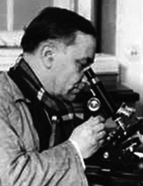

Although AS fought alongside communist militants against fascism, his thinking favoured a more relativist, conformist stance, contrary to optimistic voluntarism; in accordance with his biological paradigm, the European crisis was the result of a deterministic and inexorable process of evolution of a civilisation – every organism, upon reaching its limit of growth and differentiation, declines and dies. AS wrote a series of articles on the European crisis (1936-1938), in which he proposed a “biomechanical theory of history”. In it, he extrapolates Kretschmer’s biotypology to the interpretation of social psychology. Since his 1915 dissertation, AS had been concerned with the status of knowledge involving human variables and/or whose deterministic laws were unknown. Taking advantage of the criterion of verifiability, which gave meaning to a proposition for neopositivists, AS distinguished between science and proto-science; history and sociology are proto-sciences because they depend on “psychological thinking”, as distinct from “logical thinking”; the former is exemplified in primitive thinking in the sense of Lévy-Bruhl, in literature, in metaphysical thinking, etc.
This positivist stance is reflected in his concept of “Tyndall’s irreducibility”, a perennial element in his thinking; the choice of name recalls the profound cultural impact of the speech given to the British Association for the Advancement of Science (Belfast, 1874) by John Tyndall, professor of natural philosophy at the Royal Institution; in discussing the relationship between science and materialism, he stated that scientific knowledge translates into the requirement of “absolute reliance upon law in nature”. Tyndall described his position as ‘ ‘ or ‘higher materialism’, attributing to matter ‘the promise and potency of all terrestrial life’. Discussing the boundaries between science and religion, he stated that if the latter added ‘inward completeness and dignity to man’, it was restricted to ‘the region of poetry and emotion’. Objective knowledge was the exclusive domain of science. Everything that fell “upon the domain of science” (including the cosmological question) should be “submit to its control” (Tyndall, Fragments of Science 1892, 2. pp. 191-197). The idea of total scientificity, as far as human variables are concerned, implies knowing the mechanics of psychophysical parallelism, that is, the functional dependence between mental phenomena and the (physical-chemical) processes that occur in the brain: if the psychic plane corresponds univocally to physiological structures and processes whose laws derive from physics and chemistry, then determinism and mechanism in these domains must characterise the psychic plane.
This work is financed by national funds through FCT - Foundation for Science and Technology, I.P, in the scope of the projects UIDB/04311/2020 and UIDP/04311/2020.
